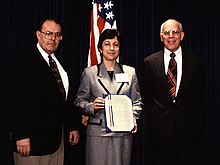John H. Gibbons
John Howard "Jack" Gibbons (born January 15, 1929 in Harrisonburg (Virginia) , † July 18, 2015 in Crozet (Virginia) ) was an American physicist. From 1993 to 1998 he was the director of President Bill Clinton's Office of Science and Technology Policy .
Gibbons attended Randolph-Macon College with a bachelor's degree in 1949 and received a PhD in physics from Duke University in 1954 . From 1954 he was at Oak Ridge National Laboratory , where he dealt with nuclear physics (including nuclear structure and neutron capture during the nucleosynthesis of heavy elements in stars). From the late 1960s, at the suggestion of Alvin Weinberg , he dealt with questions of efficient energy use and the careful use of energy resources and headed the laboratory's environmental program from 1969 to 1973. In 1973/74 he was the first director of the US Federal Office of Energy Conservation. From 1975 he was director of the Energy, Environment and Resources Center at the University of Tennessee . From 1979 to 1992 he headed the US Congressional Office of Technology Assessment to advise the US Congress on technology issues. From 1993 to 1998 he was a science and technology advisor to President Bill Clinton. In 1998/99 he was a Compton Lecturer at MIT. From 1999 to 2000 he was an advisor to the President of the National Academy of Engineering and from 1999 to 2001 an advisor to the State Department.
He was a member of the National Academy of Engineering and a Fellow of the American Association for the Advancement of Science (and its President in 2000/2001) and the American Physical Society . In 1999 he was elected to the American Philosophical Society and in 2005 to the American Academy of Arts and Sciences .
As a science advisor to Clinton, he campaigned for a program with the auto industry to promote hybrid cars, campaigned for the signing of the Comprehensive Nuclear Test Ban Treaty , and campaigned for cooperation with Russia on the International Space Station.
In 1991 he received the Leo Szilard Lectureship Award . He received the Federal Cross of Merit and became commander of the Ordre des Palmes Académiques . Gibbons was multiple honorary doctorates.
Fonts
- This Gifted Age. Science and Technology at the Millenium, Springer 2007
Web links
- Biography, White House
- William J. Broad, John Gibbons, 86, Clinton Science Aide, Dies; Pushed Cooperation in Space (New York Times obituary, Aug. 2, 2015)
Individual evidence
- ↑ Birth and career data according to American Men and Women of Science , Thomson Gale 2004
| personal data | |
|---|---|
| SURNAME | Gibbons, John H. |
| ALTERNATIVE NAMES | Gibbons, John Howard (full name); Gibbons, Jack (nickname) |
| BRIEF DESCRIPTION | American physicist |
| DATE OF BIRTH | January 15, 1929 |
| PLACE OF BIRTH | Harrisonburg, Virginia |
| DATE OF DEATH | July 18, 2015 |
| Place of death | Crozet (Virginia) |
